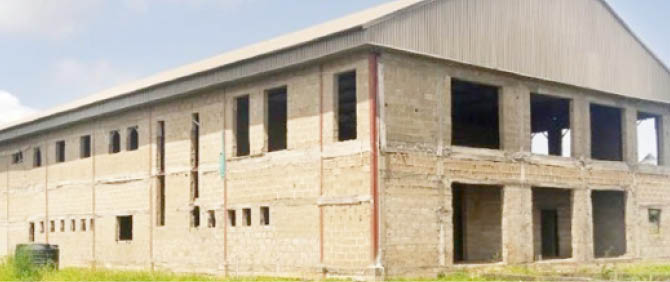Weeds take over first gold refinery project in Ogun
Almost three years after its construction began, a multi-million naira gold refinery project has been abandoned in Ogun State. The refinery is a subsidiary of Kian Smith Trade, an indigenous company which operates in minerals, commodities and marine services. The federal government granted the company the first gold refining license in June 2018. And in […]

The gold refinery project site at Omu Arogun village, Ogun State
Almost three years after its construction began, a multi-million naira gold refinery project has been abandoned in Ogun State.
The refinery is a subsidiary of Kian Smith Trade, an indigenous company which operates in minerals, commodities and marine services.
The federal government granted the company the first gold refining license in June 2018. And in December of the same year, the foundation laying of the refinery, located at Omu Arogun village, Mowe, Obafemi-Owode Local Government Area of the state, was performed by the then minister of state for mines and steel development, Abubakar Bawa Bwari, with major stakeholders, including representatives of the state government, in attendance.
Our correspondent learned that the facility, when operational, would refine three tons of gold and one ton of silver per month with regular supplies from hundreds of artisanal gold miners spread across Sokoto, Kaduna, Kano, Kogi, Nasarawa, Ekiti, and Osun, among other places in the country.
The refinery, it was further gathered, would create 500,000 jobs, as well as registration of millions of artisanal miners, which was possible within two years.
The gold refinery was expected to be completed by June 2019.
Speaking at the event, the vice chairman, Kian Smith Trade and Company, Nere Teriba, had said the refinery would be producing 99.99 per cent refined gold.
The starting production capacity was projected at 3 tons per month, of 99.99 per cent gold and 1 ton per month production of 99.99 per cent silver, she said.
“We have already secured a significant monthly supply of gold from Zamfara, Kebbi, Kwara, Niger, Kaduna, Ibadan, Ile-Ife, Ilesha, and about 100kg per month from other parts of Africa.
“We are presently finalising supply agreements and terms from suppliers in Kano. Next week, we will be securing supply from Kogi State,” she said.
However, an investigation by Daily Trust on Sunday revealed that the project is still lying fallow, almost three years after the construction began. The development has set tongues wagging among the host community.
Our correspondent who visited the project site at Omu Arogun village observed that the project has been abandoned.
The project sits on about one acre of land. It is fenced, with the structural aspect of the project about 60 per cent completed. The block laying and roofing of the two-story building project had been completed, awaiting plastering, pipe laying, among others.
Findings also showed that workers have not been to the site in the last six months, leaving the project site to be taken over by weeds.
A guard manning the project, Maruf Akinola, told Daily Trust on Sunday that he was employed a few months ago when “some Hausa guys” left the job.
He said he had no information on why the project was abandoned.
The Baale of Omu Arogun, Sufi Jinadu and another leader in the community, Jamiu Fasasi, expressed concern over the abandoned project.
Fasasi, who is the Amuludu of Omu Arogun, said the project, if completed, could provide job opportunities for youths of the community and boost socio-economic activities.
“Our youths are basically artisans; they are into bricklaying, carpentry, furniture works and others.
“A number of youths have graduated but they have no jobs,” he told our correspondent.
Our correspondent attempted to reach the vice chairman of Kian Smith Trade and Company, Nere Teriba, for comment on the abandoned projects, but without success.
Teriba didn’t pick up several calls from our correspondent, just as text and WhatsApp messages sent to her didn’t get a response as at the time of filing this report.
Recall that President Muhammadu Buhari, at the official presentation of locally mined gold bars by the Presidential Artisanal Gold Mining Development Initiative (PAGMDI) at the Presidential Villa, Abuja in 2020, reaffirmed his administration’s commitment to establishing gold refineries in the country.
He said improved gold mining operations in the country would generate at least 250,000 jobs and over $500 million annually.
Buhari added that the initiative would support efforts for the creation of jobs for Nigerians, diversify the country’s revenue base and improve foreign exchange reserves.
While reiterating the determination of the federal government to combat illegal mining activities, the president expressed concern that Nigeria lost close to $3billion from 2012 to 2018 due to illegal smuggling of gold.
“With the implementation of the PAGDMI scheme, which will result in the setting up of accredited gold buying centres across key mining areas, artisanal miners and small and medium enterprises (SMEs) engaged in mining would also be able to capture the value of their work.
“The sale of gold by artisanal miners and SMEs at accredited centres will help the government in realising royalties and taxes from the sale of these assets.
“These developments will also help in improving our foreign reserves by enabling the Central Bank of Nigeria to increase the amount of gold in its reserve.
“These gold assets, which will be purchased in naira, will not only help to bolster our international reserves but also provide a hedge against inflation and other economic volatilities associated with foreign currencies that are held in our reserves,” Buhari said.
